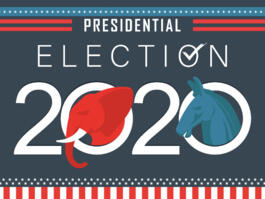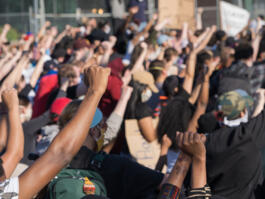Voters Favor Crackdown on Violent Protests; Most Democrats Disagree
Voters are ready for the police to put an end to the continuing violent protests nationwide. Most also say the protests will be important to their vote in the upcoming elections.
When asked which is closer to their own thinking, 50% of Likely U.S. Voters say the police should crack down on the protests to bring them to an end. A new Rasmussen Reports national telephone and online survey finds that 38% disagree and believe the protests should be allowed to continue until the protesters decide to end them. Eleven percent (11%) are undecided. (To see survey question wording, click here.)
There’s sharp partisan disagreement on this question, though. While 75% of Republicans and a plurality (47%) of unaffiliated voters think the police should crack down on the protests, just 31% of Democrats agree. Fifty-six percent (56%) of Democrats say the protests should be permitted to continue until the protesters want to end them.
Seventy-two percent (72%) of all voters say they are concerned about the growing level of violent protest nationwide, with 43% who are Very Concerned.
Sixty-two percent (62%) say the growing level of violent protest is important to their vote in the next election, including 35% who say it is a Very important voting issue.
(Want a free daily e-mail update? If it's in the news, it's in our polls). Rasmussen Reports updates are also available on Twitter or Facebook.
The survey of 1,000 Likely Voters was conducted August 10-11, 2020 by Rasmussen Reports. The margin of sampling error is +/- 3 percentage points with a 95% level of confidence. Field work for all Rasmussen Reports surveys is conducted by Pulse Opinion Research, LLC. See methodology.
The violent protests champion defunding police departments and using that money for social programs. But 66% of Americans oppose defunding the police in the community where they live. Sixty-one percent (61%) believe violent crime is likely to go up in communities that defund the police.
The older the voter, the more concerned they are about the protests.
Whites are more concerned than blacks and other minority voters. But other minorities attach the most importance to the violent protests when it comes to voting.
Forty-nine percent (49%) of Republicans rate the protests Very Important to their upcoming vote, compared to 24% of Democrats and 36% of unaffiliated voters.
When it comes to the violent anti-police protests in several major cities, most voters agree that President Trump sides with the police, while Democratic leaders side with the protesters.
Additional information from this survey and a full demographic breakdown are available to Platinum Members only.
Please sign up for the Rasmussen Reports daily e-mail update (it's free) or follow us on Facebook. Let us keep you up to date with the latest public opinion news.
The survey of 1,000 Likely Voters was conducted August 10-11, 2020 by Rasmussen Reports. The margin of sampling error is +/- 3 percentage points with a 95% level of confidence. Field work for all Rasmussen Reports surveys is conducted by Pulse Opinion Research, LLC. See methodology.
Rasmussen Reports is a media company specializing in the collection, publication and distribution of public opinion information.
We conduct public opinion polls on a variety of topics to inform our audience on events in the news and other topics of interest. To ensure editorial control and independence, we pay for the polls ourselves and generate revenue through the sale of subscriptions, sponsorships, and advertising. Nightly polling on politics, business and lifestyle topics provides the content to update the Rasmussen Reports web site many times each day. If it's in the news, it's in our polls. Additionally, the data drives a daily update newsletter and various media outlets across the country.
Some information, including the Rasmussen Reports daily Presidential Tracking Poll and commentaries are available for free to the general public. Subscriptions are available for $4.95 a month or 34.95 a year that provide subscribers with exclusive access to more than 20 stories per week on upcoming elections, consumer confidence, and issues that affect us all. For those who are really into the numbers, Platinum Members can review demographic crosstabs and a full history of our data.
To learn more about our methodology, click here.





